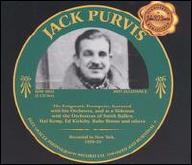It is at this point in time that Purvis' life outside of music began to interfere with his musical career. Somewhere along the way he began flying in smuggled cargo between Mexico and the U.S., he was a mercenary in South America, and a chef in both Bali and San Francisco. Purvis spent a brief period in California arranging for films, he recorded with Frank Froeba in New York (1935) and worked a bit with Joe Haymes before moving back to Los Angeles where he led a quintet. In June 1937 he began serving a prison sentence for robbery in El Paso, TX. In jail, Purvis played piano and directed the Rhythmic Swingsters, which broadcast on the radio in 1938. After violating his parole, he remained in prison until May 1947. In the years after his release, Purvis worked as a carpenter, chef and radio repairman. No doubt there are many other long-lost Purvis stories! ~ Scott Yanow, Rovi
Jack Purvis
from Kokomo, IN
December 11, 1906 - March 30, 1962 (age 55)
Biography
Jack Purvis had a crazy and somewhat legendary life that has never been fully sorted out. His career in music was actually fairly brief. He began playing trumpet and trombone in a boy's training school, and he worked in local dance bands as early as 1921. Purvis played in Lexington, KY with the Original Kentucky Night Hawks for a few years in the mid-1920s; he also worked to qualify as an airline pilot and studied music in Chicago. Purvis started freelancing in 1926, worked with Whitey Kaufman's Original Pennsylvanians, visited Europe in 1928 with George Carhart and was with Hal Kemp's Orchestra from 1929-30 (originally as a trombonist before switching to trumpet). He was with The California Ramblers in 1930, had short-term associations with The Dorsey Brothers, Fred Waring (1932-33) and Charlie Barnet (1933), and worked in radio orchestras. Purvis led three recording sessions from 1929-30 that resulted in eight titles, including Copyin' Louis and Mental Strain at Dawn. Additionally, Purvis occasionally sat in on fourth trumpet with Fletcher Henderson's Orchestra and briefly worked as a harpist.
Top Tracks
Albums
Videos
Close












